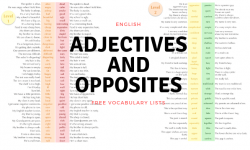Mastering Antonyms: A Comprehensive Guide for English Learners
What Are Antonyms?
Antonyms are words that have opposite meanings. Understanding antonyms is a crucial part of expanding your vocabulary and enhancing your language skills. Whether you’re preparing for a language exam, writing a creative piece, or simply communicating more effectively in English, mastering antonyms helps you express contrast and create more engaging sentences.
Let’s learn some common antonyms for verbs and adjectives, and explore how you can use them to enrich your English vocabulary.
Opposite Words / Antonyms for Verbs
Verbs are action words, and learning their antonyms allows you to express a wide range of actions and their opposites. Here’s a table of some useful antonyms for verbs:
| Verb | Antonym |
|---|---|
| Accept | Reject |
| Agree | Differ |
| Allow | Forbid |
| Advance | Retreat |
| Assemble | Disperse |
| Begin | End |
| Create | Destroy |
| Encourage | Discourage |
| Help | Hinder |
| Sleep | Wake |
As you practice these, try using them in sentences to deepen your understanding. For example:
- Agree: “We agreed on the terms of the contract.”
- Differ: “Our opinions differ on this matter.”
Notice how these opposites allow you to express the full range of situations in conversation or writing.
Opposite Words / Antonyms for Adjectives
Adjectives describe qualities, and knowing their opposites can help you paint vivid pictures in your speech and writing. Check out this list of antonyms for common adjectives:
| Adjective | Antonym |
|---|---|
| Beautiful | Ugly |
| Big | Small |
| Clean | Dirty |
| Full | Empty |
| Friendly | Hostile |
| Hot | Cold |
| Happy | Sad |
| Strong | Weak |
| Safe | Dangerous |
| Tall | Short |
For example:
- Hot: “The weather was hot all week.”
- Cold: “It’s too cold to go outside today.”
When writing essays, stories, or even emails, these adjective antonyms will make your content more dynamic and engaging.
Why Learning Antonyms is Important
Knowing antonyms helps in:
- Better Communication: You can convey exact meanings, show contrast, and clarify your message.
- Improved Writing: Using antonyms gives variety to your writing, making it more interesting and less repetitive.
- Language Exams: Vocabulary plays a significant role in exams like IELTS, TOEFL, and other language proficiency tests. Understanding antonyms will boost your scores in the reading and writing sections.
Practical Exercises
Here are a few exercises to get you started:
- Fill in the Antonyms:
Complete the following sentences by using the correct antonym:- The room was (full), but now it is _________.
- We should (accept) the proposal, but they want to _________ it.
- Sentence Creation:
Create sentences using these antonyms:- Friendly vs. Hostile
- Begin vs. End
- Strong vs. Weak
These exercises will not only help you remember antonyms but also understand how to use them contextually.
Download Your Free PDF of Antonyms
To further expand your antonym knowledge, you can download our detailed PDF guide which covers even more verb and adjective antonyms. This comprehensive resource is perfect for English learners aiming to boost their vocabulary.
Click here to download your free Antonyms PDF!
Happy learning, and stay consistent with your practice to see significant improvements in your English skills!



